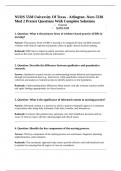NURS 5338 University Of Texas - Arlington -Nurs 5338
Mod 2 Pretest Questions With Complete Solutions
Course
NURS 5338
1. Question: What is the primary focus of evidence-based practice (EBP) in
nursing?
Answer: The primary focus of EBP in nursing is to integrate the best available research
evidence with clinical expertise and patient values to guide clinical decision-making.
Rationale: EBP aims to improve patient outcomes and ensure that nursing practices are
based on the most current and relevant information.
2. Question: Describe the difference between qualitative and quantitative
research.
Answer: Qualitative research focuses on understanding human behavior and experiences
through non-numerical data (e.g., interviews), while quantitative research involves the
collection and analysis of numerical data to identify patterns or test hypotheses.
Rationale: Understanding these differences helps nurses critically evaluate research studies
and apply findings appropriately in clinical practice.
3. Question: What is the significance of informed consent in nursing practice?
Answer: Informed consent is a process by which a patient voluntarily agrees to a treatment
or procedure after being fully informed of the risks, benefits, and alternatives.
Rationale: It ensures that patients have autonomy over their healthcare decisions and are
aware of what to expect, thereby reducing legal and ethical issues.
4. Question: Identify the key components of the nursing process.
Answer: The key components of the nursing process are assessment, diagnosis, planning,
implementation, and evaluation.
Rationale: This systematic approach helps nurses provide effective and individualized care
to patients by ensuring that all aspects of care are considered.
,5. Question: What are the primary purposes of patient education in nursing?
Answer: The primary purposes of patient education are to promote health literacy, empower
patients to make informed decisions, and improve adherence to treatment plans.
Rationale: Effective patient education can lead to better health outcomes and increased
patient satisfaction.
6. Question: How can nurses effectively manage patient pain?
Answer: Nurses can manage patient pain by conducting thorough assessments, implementing
pharmacologic and non-pharmacologic interventions, and regularly evaluating the
effectiveness of pain management strategies.
Rationale: A comprehensive approach to pain management can enhance patient comfort and
improve overall quality of care.
7. Question: What is the role of a nurse in infection control?
Answer: Nurses play a crucial role in infection control by adhering to standard precautions,
educating patients and staff, and implementing infection prevention strategies in healthcare
settings.
Rationale: Effective infection control practices reduce the risk of healthcare-associated
infections and protect patients and healthcare workers.
8. Question: Define cultural competence in nursing practice.
Answer: Cultural competence is the ability of healthcare providers to understand, respect,
and effectively interact with patients from diverse cultural backgrounds.
Rationale: Cultural competence is essential for delivering patient-centered care and
improving health outcomes for diverse populations.
9. Question: What is the importance of documentation in nursing?
Answer: Documentation is vital in nursing as it provides a legal record of patient care,
facilitates communication among healthcare team members, and ensures continuity of care.
Rationale: Accurate and timely documentation enhances patient safety and accountability in
nursing practice.
,10. Question: What are the common signs and symptoms of infection?
Answer: Common signs and symptoms of infection include fever, chills, redness, swelling,
warmth at the site, increased pain, and purulent drainage.
Rationale: Recognizing these signs is crucial for early identification and management of
infections to prevent complications.
11. Question: Describe the concept of patient-centered care.
Answer: Patient-centered care involves respecting and responding to individual patient
preferences, needs, and values, ensuring that patient values guide all clinical decisions.
Rationale: This approach enhances patient satisfaction, adherence to treatment, and overall
health outcomes.
12. Question: What are the components of a comprehensive health
assessment?
Answer: A comprehensive health assessment includes a health history, physical examination,
and review of laboratory and diagnostic tests.
Rationale: This thorough assessment provides a holistic view of the patient’s health, guiding
nursing interventions and care planning.
13. Question: Explain the significance of advanced directives in nursing.
Answer: Advanced directives are legal documents that allow patients to specify their
preferences for medical treatment in the event they become unable to communicate their
wishes.
Rationale: Understanding and honoring advanced directives is critical for respecting patient
autonomy and ensuring ethical care.
14. Question: What is the purpose of the nursing diagnosis?
Answer: The purpose of the nursing diagnosis is to identify actual or potential health
problems that nurses can address independently, guiding the development of a care plan.
, Rationale: Nursing diagnoses provide a standardized language for identifying patient needs
and facilitating appropriate interventions.
15. Question: How do nurses assess vital signs?
Answer: Nurses assess vital signs by measuring temperature, pulse, respiration, blood
pressure, and oxygen saturation using appropriate techniques and equipment.
Rationale: Regular monitoring of vital signs helps identify changes in a patient’s condition
and informs clinical decision-making.
16. Question: What are the ethical principles that guide nursing practice?
Answer: The ethical principles guiding nursing practice include autonomy, beneficence, non-
maleficence, justice, and fidelity.
Rationale: These principles help nurses navigate complex ethical dilemmas and make
decisions that prioritize patient welfare.
17. Question: What strategies can nurses use to promote effective
communication with patients?
Answer: Nurses can promote effective communication by actively listening, using clear and
simple language, asking open-ended questions, and being aware of non-verbal cues.
Rationale: Effective communication builds trust, enhances patient engagement, and
improves health literacy.
18. Question: Describe the role of critical thinking in nursing practice.
Answer: Critical thinking in nursing involves analyzing information, evaluating evidence,
and making informed decisions to provide safe and effective patient care.
Rationale: Critical thinking skills are essential for problem-solving and adapting to changing
patient needs in dynamic clinical environments.
19. Question: What is the significance of interdisciplinary collaboration in
healthcare?
Answer: Interdisciplinary collaboration involves teamwork among healthcare professionals
from different disciplines to provide comprehensive and coordinated care for patients.




